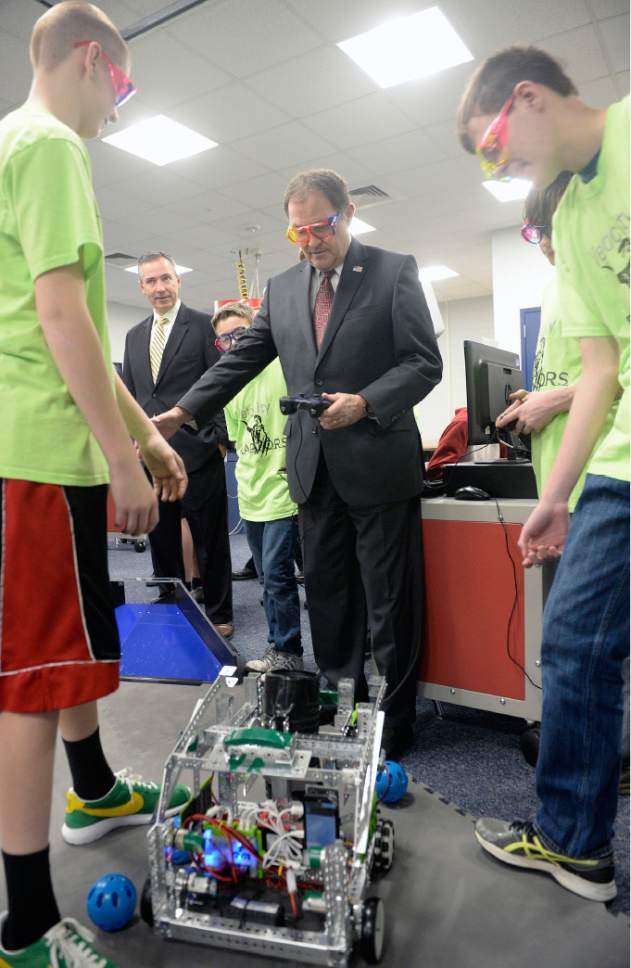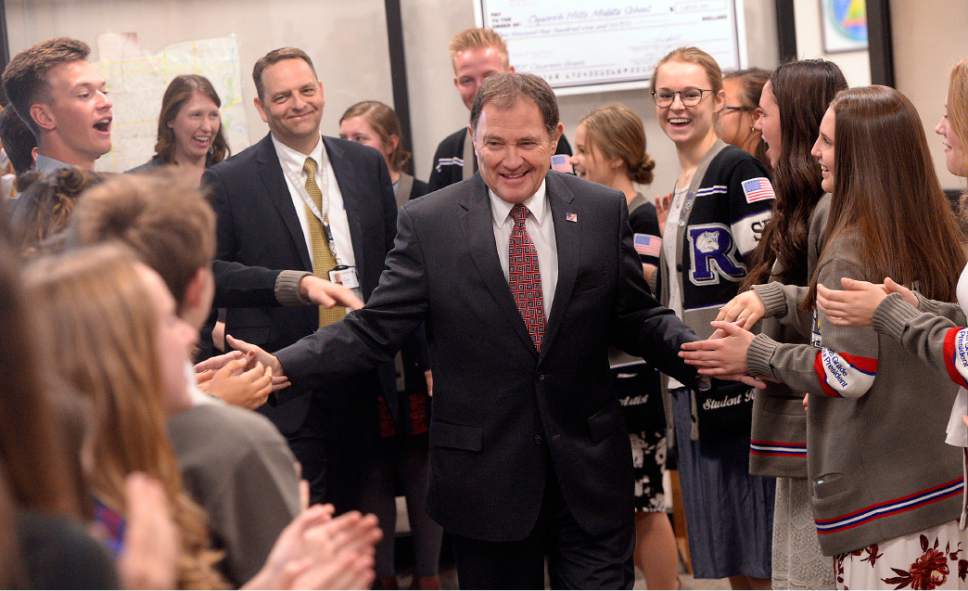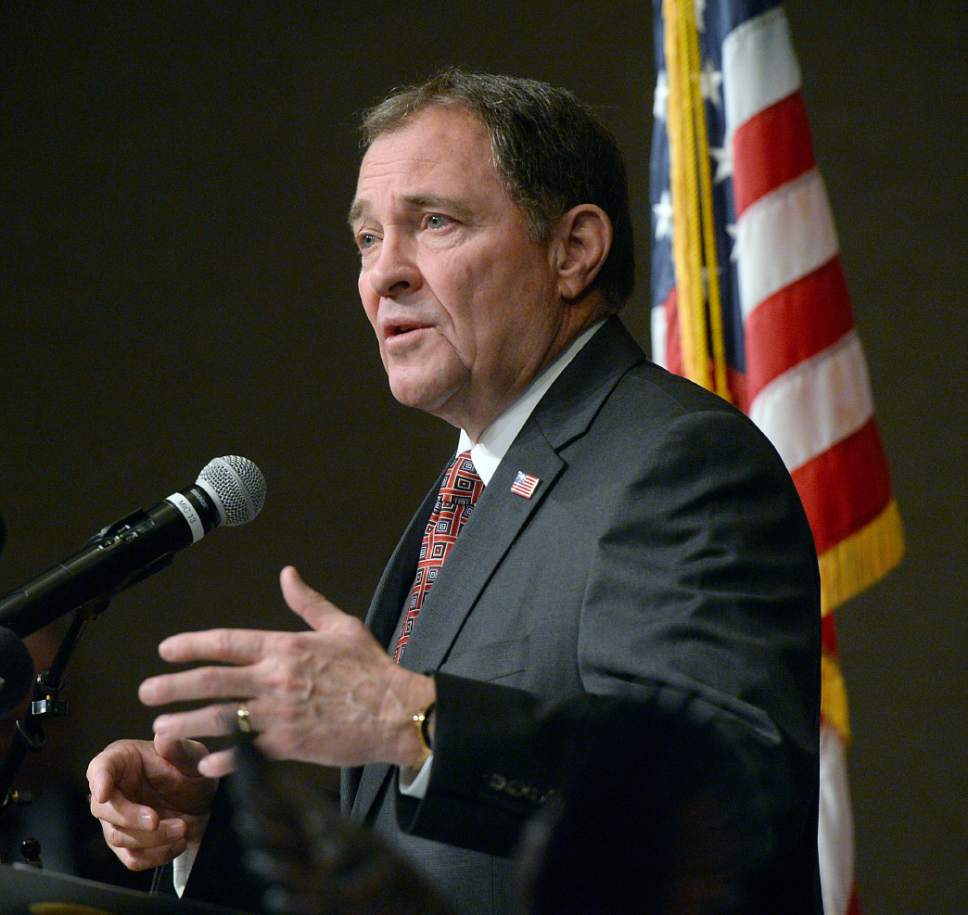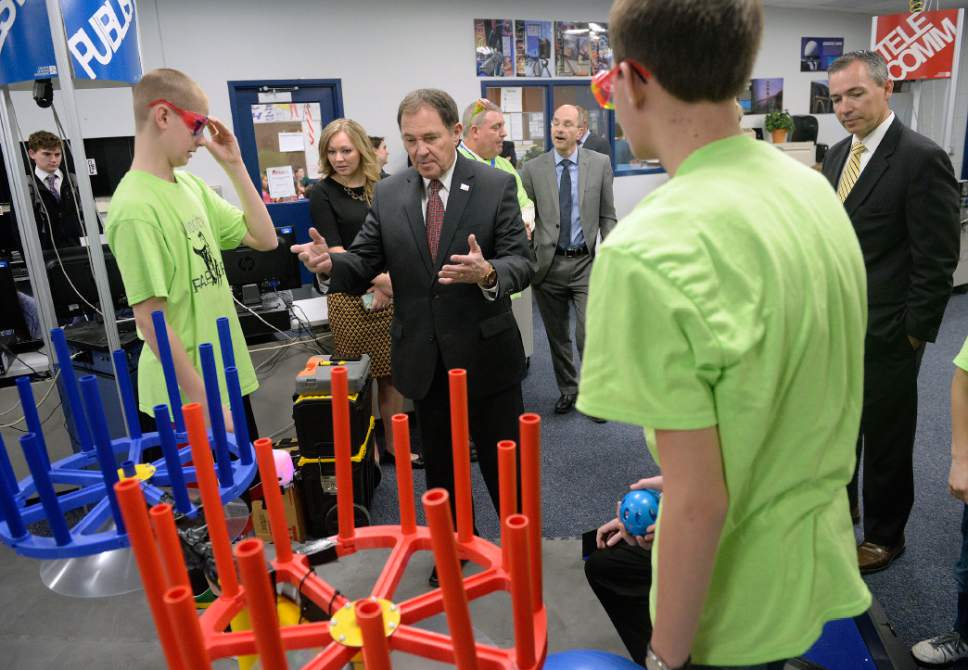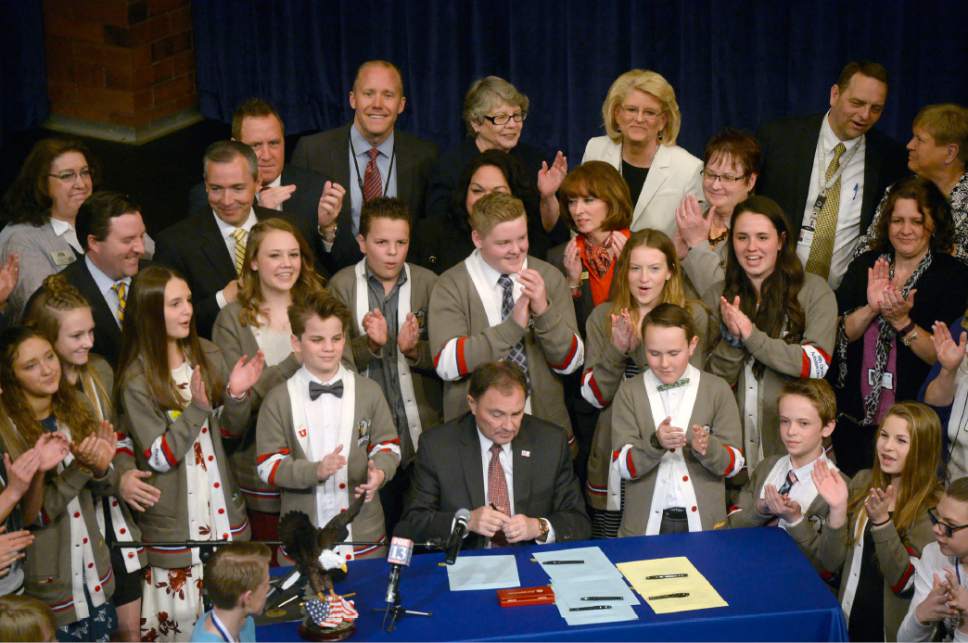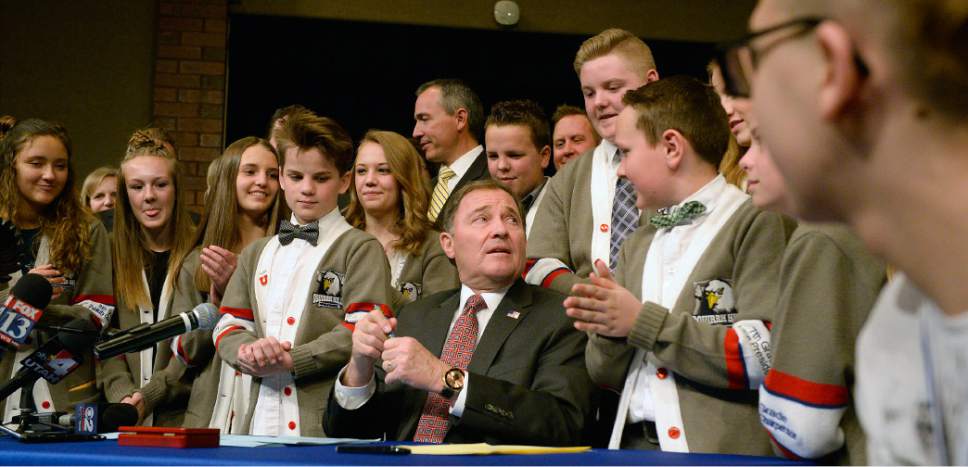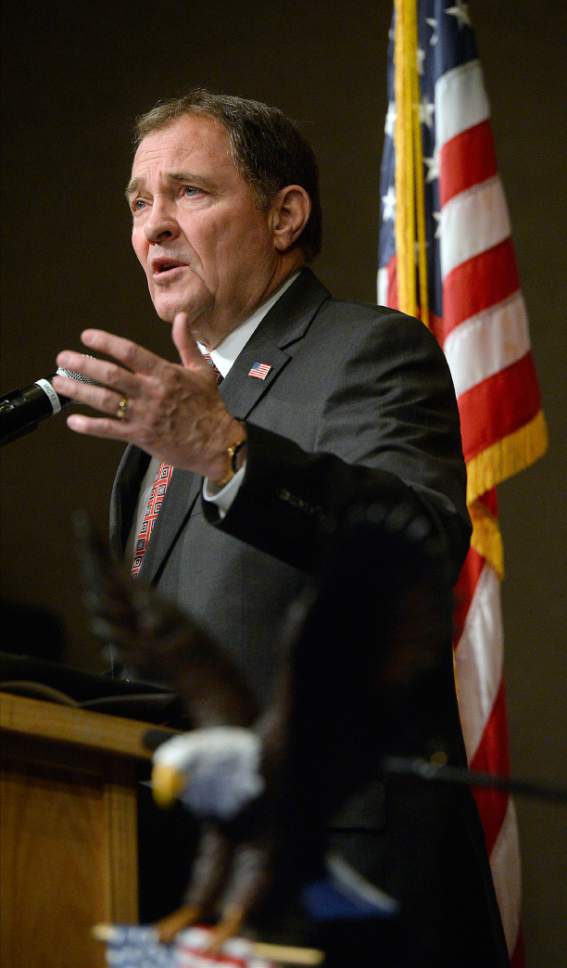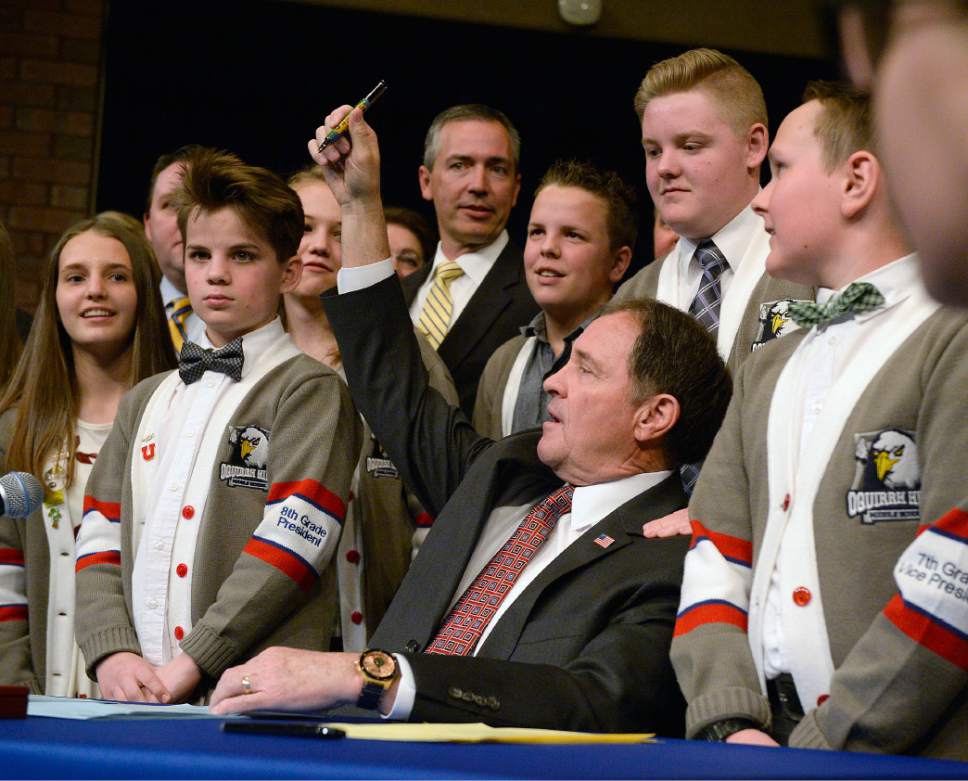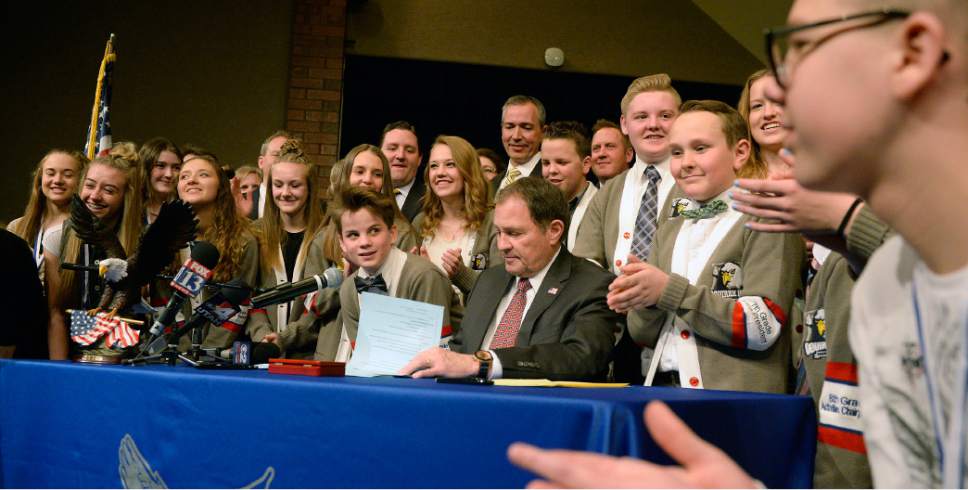This is an archived article that was published on sltrib.com in 2017, and information in the article may be outdated. It is provided only for personal research purposes and may not be reprinted.
Riverton • Before adding his signature to the final bills of the 2017 legislative session Wednesday, Utah Gov. Gary Herbert donned a pair of rainbow-colored safety goggles and took a robot for a spin.
Touring Oquirrh Hills Middle School, Herbert visited members of the school's Velocity Raptors robotics team, who handed the controls for their competition machine over to the governor for an attempt at scooping up a blue exercise ball.
Herbert was able to line the robot up with its target. But a faulty motor stopped the robot's arms from lifting up the ball — which in turn would have triggered the intro to "Circle of Life" from The Lion King.
"I did my part," Herbert said, before turning the robot and rushing it at a newspaper photographer crouching nearby. "Here's what I think of the press."
Herbert saved a package of education bills for his last day to sign or veto new legislation. Flanked by lawmakers, educators and Oquirrh Hills Middle School students, the governor ratified new laws related to bullying prevention and teacher evaluations, as well as a new public education budget that adds roughly $240 million to school spending.
Within that funding is $68 million to address enrollment growth, and about $120 million — a 4 percent increase — in per-student spending that can be used at the discretion of local administrators on salaries, classroom technology or other priorities.
Herbert's office also released a final list of bill actions Wednesday, including several pieces of legislation that will be enacted into law without the governor's signature, an indication that he didn't favor these ideas.
Among those bills is HB136, a largely symbolic law that encourages the Utah Board of Education to request state dollars to compensate for funding that could be lost by ignoring federal education programs. Herbert said his decision to neither sign nor veto HB136 and six other bills was due to their being unnecessary and redundant.
"Rather than sign them, because they have really no impact pro or con, I just let them go into law without my signature," he said.
The last batch of bills signed by the governor includes SB185, which makes Utah the first state to allow lawsuits against pornographers for damage to minors — including seeking reimbursement for any therapy expenses.
The new law offers immunity to those distributors who make a good-faith effort to verify a viewer's age and prominently display a content warning about the dangers of pornographic material. That bill is a sequel to a resolution last year that declared pornography to be a "public health crisis."
Sen. Todd Weiler, R-Woods Cross, sponsor of last year's resolution and the pornography lawsuit proposal, said he sees the new law as similar to early litigation against the tobacco industry that over time helped the public to realize the health risks of smoking.
Herbert on Wednesday praised the bipartisan collaboration of Utah's lawmakers during the 2017 session. While the public may have focused on divisive proposals, he said, the majority of bills passed with unanimous or near-unanimous support of both major political parties.
The governor vetoed a single piece of legislation this year, HB11, which would have removed a requirement for partisan representation on state boards and commissions.
"It's very easy to be a critic of this or a critic of that," Herbert said. "By and large, our Legislature works very closely together representing the people of Utah."
Herbert also did not exercise any line-item budget vetoes, aside from cleanup actions as a result of budgeted bills failing to pass before the legislative session adjourned. But his office released a letter Wednesday that suggested concern over some areas of earmarked education spending.
The letter highlighted budget items that increase state funding for the private online preschool program UPSTART and elementary reading software, and set aside $250,000 for ProStart Culinary Arts, a high school program affiliated with the Teen Chef Masters reality television show.
Herbert vetoed ProStart and UPSTART funding last year, prompting a special session to avoid a veto override by lawmakers. He wrote Wednesday that ProStart funding should be used for in-school culinary arts education and not for the production of a television show, and that the state should review the efficacy of its private preschool and software providers.
"If we feel the state has a role in performing research and development that benefits private technology companies, this role should not be continuous," Herbert wrote, "but rather, on a limited pilot-study basis for new, promising products."
Rep. Dan. McCay, R-Riverton, said the education budget committee he co-chairs plans to review all of the state's education earmarks over the coming months.
"We are going to look at all the below-the-line items very closely," McCay said. "Nothing is sacred."
Tribune reporter Lee Davidson contributed to this story.
Twitter: @bjaminwood


